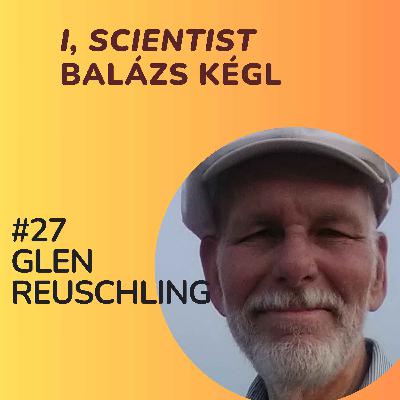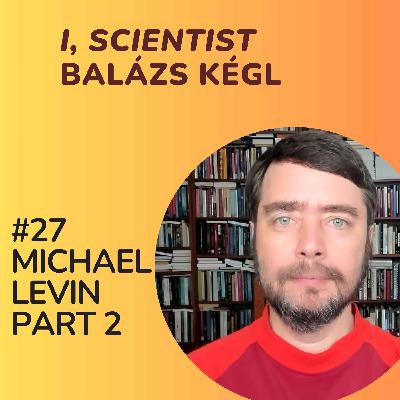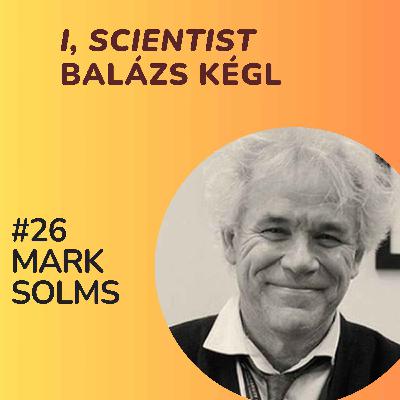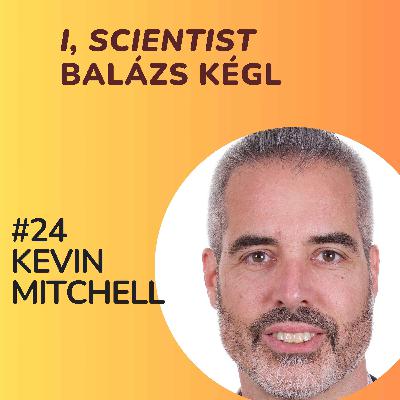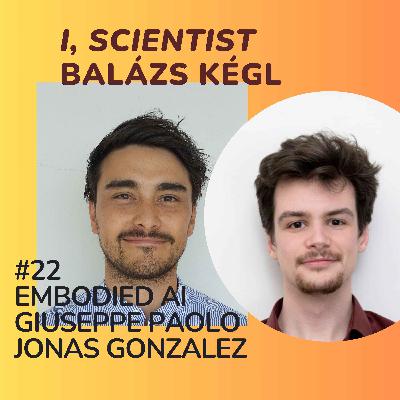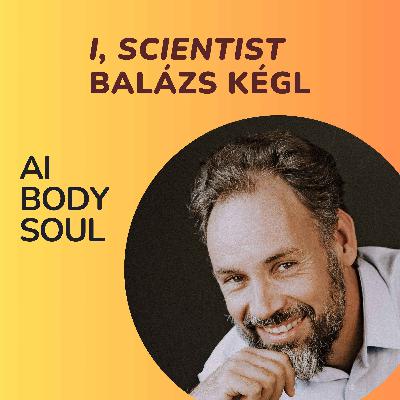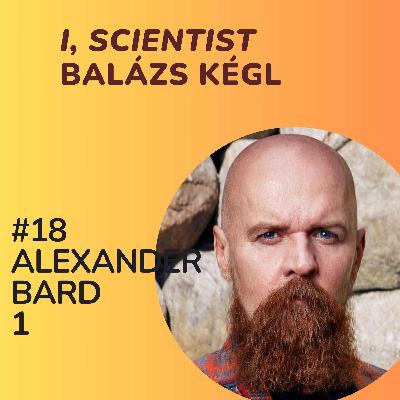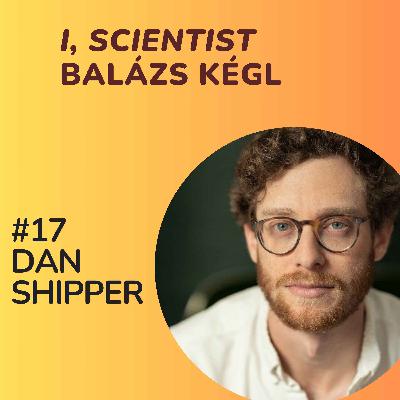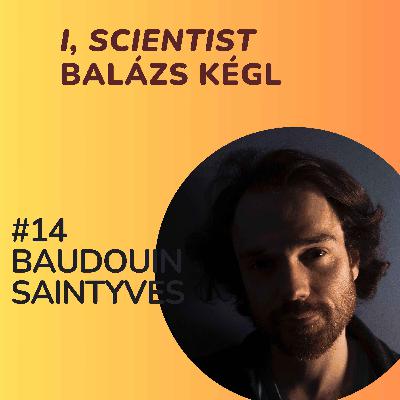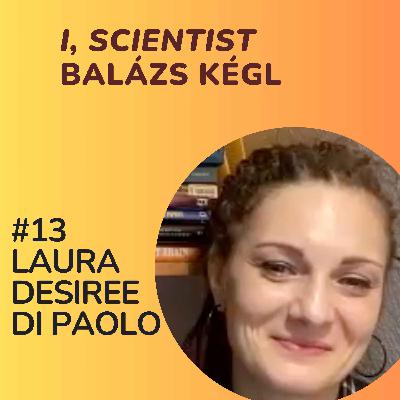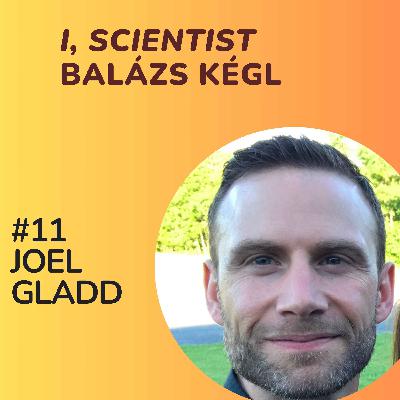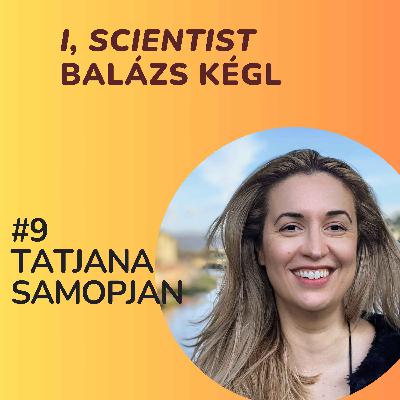Discover I, scientist with Balazs Kegl
I, scientist with Balazs Kegl

I, scientist with Balazs Kegl
Author: Balazs Kegl
Subscribed: 0Played: 34Subscribe
Share
© Balazs Kegl
Description
28 Episodes
Reverse
My first conversation with Michael Levin, a developmental biologist revolutionizing how we think about cellular collective, agency, and life in general. One of those conversations where I feel we dive deep and only scratch the surface, at the same time: nested agents, birth, aging, and death, third person and first person science. Related episodes:Embodied AI: https://youtu.be/JZ8GTucClpMAlexander Ororbia: https://youtu.be/N83vBfz7_BIBaudouin Saintyves: https://youtu.be/NmvzEpz9R84Laura Desiree Di Paolo: https://youtu.be/9txUwVtAOBkAnna Riedl: https://youtu.be/w2ZiSWZNQsgAnna Ciaunica: https://youtu.be/x1QHwhlCn-8Giuseppe Paolo: https://youtu.be/R7tEd65e2i800:00 Intro.04:11 Agency. Cellular cognition. How to prompt cells?18:45 Nested agency. Interpenetrating ecosystems, vertical and horizontal. The life of persistent patterns.23:46 Nested cognitive light cones: how do goals grow in collective agents?31:34 What do the parts think about the whole? How does higher level meaning manifests itself at lower levels? The shamanistic method of first-person "science".38:33 Why do we die? Layered ontology and Bard's process and event: the dynamics of nested agents. Birth, death, self-transformation. Psychological theory of aging. Vervaeke's reciprocal narrowing.I, scientist blog: https://balazskegl.substack.comTwitter: https://twitter.com/balazskeglArtwork: DALL-EMusic: Bea Palya https://www.youtube.com/channel/UCBDp3qcFZdU1yoWIRpMSaZw Hosted on Acast. See acast.com/privacy for more information.
One of the conversations I enjoyed the most, where we explored AI, hardware, Platonic patterns, and nested agency in a free flow, and got somewhere together, with Glen Reuschling, a retired electronics engineer with whom I often converse here on X. Related episodes:Michael Levin: https://youtu.be/3zqI0iG428cMark Solms: Mark Solms: https://youtu.be/Rltfm-vWvgMKevin Mitchell: https://youtu.be/nqxq-BiCr-MMichael Levin: https://youtu.be/0nMXYdayQIUEmbodied AI: https://youtu.be/JZ8GTucClpMAlexander Ororbia: https://youtu.be/N83vBfz7_BIYogi Jaeger: https://youtu.be/5UJ4y2L2qpkBaudouin Saintyves: https://youtu.be/NmvzEpz9R84Laura Desiree Di Paolo: https://youtu.be/9txUwVtAOBkAnna Riedl: https://youtu.be/w2ZiSWZNQsgAnna Ciaunica: https://youtu.be/x1QHwhlCn-8Giuseppe Paolo: https://youtu.be/R7tEd65e2i800:00:00 Intro: Glen's electronics engineer background and his interest in embodied AI.00:07:11 Why Embodied AI is not mainstream? The anxiety of the pure Platonist AI researcher.00:08:31 Michael Levin and his Platonic turn. Jonathan Pageau's fractal ontology. Idealism vs transjectivity. Static top-down fractals vs dynamic bottom-up cellular automata. Had patterns existed before the world was born? Or they transjectively realized each other?00:17:47 Molecular and quantum agency. Randomness, determinacy, and free choice. What if what looks like random from the outside is in fact a conscious decision of an agent, from the inside.00:33:00 Omnipotence or finite attention and information bottleneck all the way up? Conway's caution of free will. Nondeterministic universe.00:44:10 Is God eternal or emerges as everything else? Are patters eternal or they also emerge? Do they have agency? 00:51:04 Symbols and hardware. Logical gates and binary logic are abstractions, what really happens is a flow of electrons.00:54:54 Is ChatGPT conscious? If not, what's the fundamental difference between me and ChatGPT. Integrated vs isolated layers of abstractions.00:59:23 Computation = physical process in which a language acquires agency?01:06:11 Herding randomness in living bodies vs eliminating randomness by error correction in machines. Hardware is more capable than we're using it for. Agricultural robots. Nested languages. Conversational computation. The role of feelings.01:19:36 For AGI, we will need to rethink the whole computer science stack, not only the top software layer.01:22:35 Glen's programmable pacemaker.I, scientist blog: https://balazskegl.substack.comTwitter: https://twitter.com/balazskeglArtwork: DALL-EMusic: Bea Palya https://www.youtube.com/channel/UCBDp3qcFZdU1yoWIRpMSaZwhttps://youtu.be/gjlLnvci30w Hosted on Acast. See acast.com/privacy for more information.
My second conversation with Mike Levin, the developmental biologist from Tufts University, where we explore his ontology, the structure of the world. Are we biological interfaces to Platonic minds, or bodies and minds co-create or realize each other? Is ChatGPT conscious? Are machines more organismic than we thought? How should we get ready to communicate with minds who are very different from us?Related episodes:Mark Solms: Mark Solms: https://youtu.be/Rltfm-vWvgMKevin Mitchell: https://youtu.be/nqxq-BiCr-MMichael Levin: https://youtu.be/0nMXYdayQIUEmbodied AI: https://youtu.be/JZ8GTucClpMAlexander Ororbia: https://youtu.be/N83vBfz7_BIYogi Jaeger: https://youtu.be/5UJ4y2L2qpkBaudouin Saintyves: https://youtu.be/NmvzEpz9R84Laura Desiree Di Paolo: https://youtu.be/9txUwVtAOBkAnna Riedl: https://youtu.be/w2ZiSWZNQsgAnna Ciaunica: https://youtu.be/x1QHwhlCn-8Giuseppe Paolo: https://youtu.be/R7tEd65e2i800:00:00 Intro00:02:22 Mike's Platonic turn. Patterns are calling the shots. Prime numbers and cicadas. Anthrobots. Let's study the structure of emergence.00:14:55 Why not the Platonic and the "real" (Bard calls it pathic) realize each other rather than one creating the other? Towards more Darwinian forms? The engineering view: who controls what.00:21:15 Do patterns have agency? Do they feel? Patterns are agents. Lot of "free" computation is happening in the Platonic space.00:27:44 Can Platonic patterns die? Some patterns can survive the death of their physical instantiation. What is the ultimate drive if not persistence/survival? Similarity to Pageau's fractal ontology.00:36:26 Is ChatGPT conscious? If they are, it's not because they talk but because they might have intrinsic motivation. It's not that we are machines, rather machines are also organismic. The free spurious modes in the structure space: the mystery of bubble sort and other structuralist arguments. The organicist argument of integration of the nested agents. Computer levels are separated, organismic layers are integrated.00:52:49 How did your views changed your life? The urgency to communicate to minds that are very different from us.I, scientist blog: https://balazskegl.substack.comTwitter: https://twitter.com/balazskeglArtwork: DALL-EMusic: Bea Palya https://www.youtube.com/channel/UCBDp3qcFZdU1yoWIRpMSaZw Hosted on Acast. See acast.com/privacy for more information.
Another mind-blowing conversation, this time with Mark Solms, the neuropsychoanalist from the University of Cape Town, about his feeling-based theory of consciousness, how competing homeostatic needs lead to prioritization of responding to feelings, expressing these needs internally. At about the one hour mark, we go beyond and discuss how feelings can be understood as messages between hierarchical levels of conscious nested organisms.Mark's book: https://www.amazon.com/Hidden-Spring-Journey-Source-Consciousness/dp/0393542017A nine-episode conversation about the book: https://www.youtube.com/playlist?list=PLMxiNrgE29RIKY3hzQQlFZzkH85xsB4VrRelated episodes:Kevin Mitchell: https://youtu.be/nqxq-BiCr-MMichael Levin: https://youtu.be/0nMXYdayQIUEmbodied AI: https://youtu.be/JZ8GTucClpMAlexander Ororbia: https://youtu.be/N83vBfz7_BIYogi Jaeger: https://youtu.be/5UJ4y2L2qpkBaudouin Saintyves: https://youtu.be/NmvzEpz9R84Laura Desiree Di Paolo: https://youtu.be/9txUwVtAOBkAnna Riedl: https://youtu.be/w2ZiSWZNQsgAnna Ciaunica: https://youtu.be/x1QHwhlCn-8Giuseppe Paolo: https://youtu.be/R7tEd65e2i800:00:00 Intro00:04:35 Feeling-based consciousness. Anatomy: brain-stem vs cortical models.00:20:43 The free energy principle and active inference. Do membranes exist? 00:41:00 The mechanisms of consciousness and the role of feeling. Prioritization of needs, voluntary actions, choice. Categorically different needs lead to qualia.01:00:19 Hierarchical levels of nested organisms and feelings as messages.01:27:46 Engineering consciousness. Is autopoiesis necessary?I, scientist blog: https://balazskegl.substack.comTwitter: https://twitter.com/balazskeglArtwork: DALL-EMusic: Bea Palya https://www.youtube.com/channel/UCBDp3qcFZdU1yoWIRpMSaZw Hosted on Acast. See acast.com/privacy for more information.
My fourth conversation with the philosopher Alexander Bard, on his new book project on mysticism, bliss, the importance of phenomenology, the philosophy of time, transcendence, and transformation.Related episodes:https://youtu.be/Y8cuqy6y0fo Alexander Bard part 1: sex, Zoroastrianism, embodied philosophyhttps://youtu.be/eASbv9WA-TQ Alexander Bard part 2: tantric sex, sex and spirituality, men's workhttps://youtu.be/3eAwktR3S3s Alexander Bard part 3: anthropology and AIBard on Sweeney, discussing the book project on mysticismhttps://www.youtube.com/watch?v=gFU0ot5daoghttps://www.youtube.com/watch?v=VtaDAqbAE3Ahttps://www.youtube.com/watch?v=XxlQyzDwTfo00:00:00 Intro: making philosophy.00:03:33 Why mysticism? Transcendence and transformation. The philosophy of time.00:14:53 The right order: phenomenology -> epistemology -> ontology of mysticism. Pathos-mythos-logos and subconscious/conscious. Only present exists. The past subsists and the future absists. The past is determinate, the future is indeterminate, the present is transdeterminate.00:26:08 Animal philosophy.00:28:51 Phenomenology of mysticism. Dancing myself unconscious. Varayana Buddhism. The two subjectless extreme states: pure experience and the infinite now. You can't do science of consciousness. 00:37:47 The historical and sociological context: pillar saints and boy pharaohs, sutra/tantra. The infinite now and orgasm. 00:49:41 Pure experience and the other-world dualism. The psychoanalytical view: neurosis and psychosis. Mamilla and embodiment.01:01:24 Mysticism is minimalism. The job of philosophy to kill axioms. Mysticism is practiced philosophy. Mysticism kills fantasies about how the world works. The importance of integration.01:09:42 The problem with western existentialism is that it assumes the subject is constant.01:10:17 Why go mystic? Why you? Why now? How? The birth of a child: instant bliss. Go deeper?01:14:22 The first thing the mystic says: there is no purpose to this. The phenomenology-epistemology loop has been ignored by philosophers.I, scientist blog: https://balazskegl.substack.comTwitter: https://twitter.com/balazskeglArtwork: DALL-EMusic: Bea Palya https://www.youtube.com/channel/UCBDp3qcFZdU1yoWIRpMSaZw Hosted on Acast. See acast.com/privacy for more information.
My conversation with Kevin Mitchell, neuroscientist and geneticist at Trinity College Dublin, on free agency and randomness, nested selves, mental causation and the tension between free choice and control, and artificial agents.Kevin's books:Free Agents: https://www.amazon.com/Free-Agents-Evolution-Gave-Will/dp/0691226237/Innate: https://www.amazon.com/Innate-How-Wiring-Brains-Shapes/dp/0691204152/Related episodes:Michael Levin: https://youtu.be/0nMXYdayQIUEmbodied AI: https://youtu.be/JZ8GTucClpMAlexander Ororbia: https://youtu.be/N83vBfz7_BIYogi Jaeger: https://youtu.be/5UJ4y2L2qpkBaudouin Saintyves: https://youtu.be/NmvzEpz9R84Laura Desiree Di Paolo: https://youtu.be/9txUwVtAOBkAnna Riedl: https://youtu.be/w2ZiSWZNQsgAnna Ciaunica: https://youtu.be/x1QHwhlCn-8Giuseppe Paolo: https://youtu.be/R7tEd65e2i800:00:00 Intro: the psychological angle of theories of consciousness.00:05:00 Free agency and randomness. The world is nondeterministic, but where the possibility of control comes from? Causal slack + selection.00:15:14 The tension of randomness: its harmful but it also needs to be nurtured and amplified. From particle decay to neural "noise".00:21:38 Nested agency and cognition. Vertical dynamics of hierarchical distributed control. Multicellularity. 00:34:58 What looks random from outside may be what the 1st person system experiences as free agency. Psychopathologies.00:40:58 Selves and fuzzy boundaries. Dyads and collectives. Couples' therapy, ant colonies, lineages.00:55:58 Spirituality. Being part of a bigger organism. Rituals. Game theory and incentive design.01:08:30 AI. AGI vs _an_ AGI. Agency in Minecraft.01:18:58 What's next for Kevin? The tension of choice and control. Mental causation. Genetic decoding. I, scientist blog: https://balazskegl.substack.comTwitter: https://twitter.com/balazskeglArtwork: DALL-EMusic: Bea Palya https://www.youtube.com/channel/UCBDp3qcFZdU1yoWIRpMSaZw Hosted on Acast. See acast.com/privacy for more information.
Meet my two wonderful colleagues with whom we wrote a position paper last year "A Call for Embodied AI". We talk about the limits of the current "internet AI" paradigm. We agree that singularity, if even a thing, is very far, LLMs will not lead there, but that social media AI is already an embodied AI that is seamlessly rewiring us.Paper: https://proceedings.mlr.press/v235/paolo24a.htmlRelated episodes: Yogi Jaeger: https://youtu.be/5UJ4y2L2qpkAnna Riedl: https://youtu.be/w2ZiSWZNQsgAnna Ciaunica: https://youtu.be/x1QHwhlCn-8Alexander Ororbia: https://youtu.be/N83vBfz7_BILaura Desire di Paolo: https://youtu.be/9txUwVtAOBk00:00:00 Intro.00:02:54 Why are we interested in embodied AI? Robotics and philosophy.00:12:10 The ingredients of embodied AI.00:15:30 Affordances. Seeing the world as a set of meanings rather than a set of objects. Who is setting the goals?00:28:29 Karl Friston's Free Energy Principle and Active Inference. Open and closed worlds. The hardware challenge. Filtering and relevance realization. Jaeger's non-computationality argument.00:39:36 Lecun's JEPA and our criticism: representation is not objective, it is transjective. Babies learn interactively. The importance of love (binding) and self-sacrifice. Levin's TAME. Multi-agent emergence.00:52:23 AGI. What do we want from AGI to be? Life? Slaves? Asimov's I, Robot, and the impossibility of propositional alignment.01:01:50 The issue with optimization: timescale. Levin's cognitive cones. The only answer is love.01:07:44 Social media AI. The Algorithm, feed, companies, advertisement. The subconscious of internet. The danger. How are they embodied? They are spirits. I want access to the Algorithm at an intermediate level. I, scientist blog: https://balazskegl.substack.comTwitter: https://twitter.com/balazskeglArtwork: DALL-EMusic: Bea Palya https://www.youtube.com/channel/UCBDp3qcFZdU1yoWIRpMSaZw Hosted on Acast. See acast.com/privacy for more information.
This is the brainiest of my three episodes with Alexander Bard.The deepest analysis I know of the US election, from a centrist/neutral point of view, from the psychoanalytical to the anthropological.A look at AI from an anthropological angle. AI cannot do abduction, lacks emotional intelligence thus creativity. Hallucinations, Wikipedia, and the St Tropez nude beach. Dreams and the psychoanalysis of AI. Netocracy and consumariat. The first part of our conversation: https://youtu.be/Y8cuqy6y0foThe second part of our conversation: https://youtu.be/eASbv9WA-TQProcess and Event seminar series on Parallax: https://www.youtube.com/playlist?list=PLSc7jFP5VeNHTwj4vzq7Tv6UIhAPCC4vpAlexander Bard is a philosopher and futurist specializing in the relationship between humanity and technology, with a profound interest in psychoanalysis and anthropology to understand the impact of technological change on interpersonal relationships.00:00:00 Intro.00:03:32 Bard's anoject: the anonymous subject with which we like to identify. It takes off our responsibility for our acts and beliefs. Kristeva's abject: the scapegoat who we blame. Psychoanalysis meets society.00:24:41 The hyperject: Moses the hero who leads us out of our misery, or Jesus, the scapegoat turned messiah who saves us by his existence. Anoject and hyperject are the ultimate extremes of subjectivity. The test: is the power player heroic, or playing into my resentment.00:31:15 How do we know that when we talk about Man (as an anthropologist), we don't fall into anojectification? Democracy is about the king not getting killed when losing power, not about the will of the people.00:39:14 AI. How the mechanisms of fear, resentment, ano- and abject and hyperjectification, shape our technological world. Social media creates lynch mobs. 00:58:16 AI cannot do abduction, lacks emotional intelligence thus creativity. Make AIs compete. Hallucinations, Wikipedia, and the St Tropez nude beach. Dreams and the psychoanalysis of AI. Netocracy and consumariat.I, scientist blog: https://balazskegl.substack.comTwitter: https://twitter.com/balazskeglArtwork: DALL-EMusic: Bea Palya https://www.youtube.com/channel/UCBDp3qcFZdU1yoWIRpMSaZw Hosted on Acast. See acast.com/privacy for more information.
We get deep into identity and death. If you are fascinated by Michael Levin and Jonathan Pageau, this conversation is for you.Fascinating discussion where we go beyond the Free Energy Principle, and even Levin's cognitive cones, and postulate that crucial internal structures, a subset of me, are what define identity. If they get damaged, I lose my identity. Deep self-transformation may also rupture my continuity. When does it happen, when do I die, as opposed to my subsystems dying? Very much a sequel to my conversation with Yogi Jaeger (https://youtu.be/5UJ4y2L2qpk). The paradox of self-preservation vs self-sacrifice. Maverick computing and organoids.Alexander is an Assistant Professor of Computer Science at Rochester Institute of Technology. He directs the Neural Adaptive Computing (NAC) Laboratory where they work on developing new learning procedures and computational architectures that embody various properties of biological neurocircuitry and are guided by theories of mind and brain functionality. His research focuses on predictive processing, active inference, spiking neural networks, competitive neural learning, neural-based cognitive modeling, and metaheuristic optimization.Alexander's webpage: https://www.rit.edu/directory/agovcs-alexander-ororbiaPaper link: https://arxiv.org/abs/2311.09589Biological learning survey: https://arxiv.org/abs/2312.0925700:00:00 Intro00:01:37 Geoff Hinton's "mortal computation" idea: what if software and hardware were inseparable? Cybernetics, thermodynamics, 4e cognitive science, basal cognition.00:11:20 Hinton's energy consumption argument.00:21:01 The self-preservation directive is the source of intelligence. The free energy principle. The non-equilibrium steady state is your identity.00:32:21 The paradox of the membrane: a permeable separation of inside and outside. The nestedness of inside and outside: fractal structure. Beyond FEP: identity-defining internal structures. Subsystemic death. Bottom-up and top-down causation.00:52:12 Why mortal (as opposed to living) computation? The crucial role of finite time horizon.01:01:49 The paradox of self-preservation vs self-sacrifice. Life drive vs death drive. Is death a must? Maverick computing and organoids.01:15:38 My take on embodiment and mortality.I, scientist blog: https://balazskegl.substack.comTwitter: https://twitter.com/balazskeglArtwork: DALL-EMusic: Bea Palya https://www.youtube.com/channel/UCBDp3qcFZdU1yoWIRpMSaZw Hosted on Acast. See acast.com/privacy for more information.
This is my second conversation with the philosopher Alexander Bard. Yoga and alignment, downwards in the body and upwards in the sociont. Archetypology and rituals. Tantric sex and the sex/religion/spirituality triad. The masculine drive towards the project. Collective purpose and men's work. The first part of our conversation: https://youtu.be/Y8cuqy6y0foProcess and Event seminar series on Parallax: https://www.youtube.com/playlist?list=PLSc7jFP5VeNHTwj4vzq7Tv6UIhAPCC4vpAlexander Bard is a philosopher and futurist specializing in the relationship between humanity and technology, with a profound interest in psychoanalysis and anthropology to understand the impact of technological change on interpersonal relationships.00:00:00 Intro00:03:19 My Yoga experience and the general notion of alignment. Relation to the sociont and tribology. Relation to couple therapy. The chemistry of a music band.00:12:31 Archetypology. Psychology, psychoanalysis, sociology, data anthropology. Internal family system. Families, clans, and tribes.00:25:51 Rituals: Eliade and Van Gennep, idiosyncratic nuclear family. Event/process in wedding/marriage.00:29:10 Sex. The sexualized process and event. Sexuality and spirituality. Taoist sex. Meditation vs absolute bliss: sexuality and psychedelics.00:38:09 Tantric/Taoist history and modern teachers.Mantak Chia, David Deida, John Wineland, Kim Anami. Dualist Islam Sufism and monist Zoroastrian Zufism.00:42:15 Alexander's six-episode course on Process and Event, relation to Awakening from the Meaning Crisis. But P&E doesn't avoid the bliss like AFTMC. The ego appears in the dialectics of the pure experience (meditation) and bliss (tantric sex).00:45:20 Purpose. My tribal experience in the Pierre Auger experiment. Monastery = tribe + mission. Project precedes subject and object.00:54:46 Relevance realization, where the project comes from? 01:01:27 Collective purpose, flow, and men's work.I, scientist blog: https://balazskegl.substack.comTwitter: https://twitter.com/balazskeglArtwork: DALL-EMusic: Bea Palya https://www.youtube.com/channel/UCBDp3qcFZdU1yoWIRpMSaZw Hosted on Acast. See acast.com/privacy for more information.
This is my first and definitely not the last encounter with the philosopher Alexander Bard. We discuss his grand oeuvre of metaphysics: Process and Event.Why should you only trust a philosopher with a great sex life? Shit happens: a philosophy that starts in the here and now. Boy pharaohs and pillar saints: the two faces of Gnosticism. Our issues with Christianity: lack of embodiment, lack of mature adulthood. How is the day of a good Zoroastrian?Exciting conversation, brotherly love at first sight. Enjoy!!Alexander Bard is a philosopher and futurist specializing in the relationship between humanity and technology, with a profound interest in psychoanalysis and anthropology to understand the impact of technological change on interpersonal relationships.00:00:00 Intro00:05:15 Don't trust a philosopher who doesn't have a great sex life. What's wrong with Gnosticism. Philosophy and the psychology of the philosopher. Convincing vs aspiration, manipulation vs seduction, winning vs going somewhere together: the dance.00:10:47 Process and Event. East over west. Uniting theology and philosophy. Yin-yang philosophy. Start from the nomadic. If you hide the process, you have to repeat the event. Keep the dichotomy and contradiction.00:23:57 Zoroastrianism. The love of wisdom. Only archetypes reincarnate. The adult religion.00:30:53 Religion. How to create stable communities? Fire temples, initiation, Nowruz.00:39:08 Why am I not a Christian? My son's baptism. God's omnipotence and Gnosticism. The fear of the ecstatic.00:46:11 Jonathan Pageau's monist Christianity. The philosophical vs the supernatural tradition.00:49:18 Transcendental emergentism. Boy pharaohs and pillar saints. The king and the priest. What's wrong with reductionism (both physicalism and panpsychism)? Shit happens. Emergence vectors (physics, chemistry, biology, consciousness).01:01:13 Yoga, alignment, Taoism, Buddhism, and Zoroastrianism, Gnosticism and omnipotence. From a Child of a God, becoming an Adult of an Adult: enlightenment.I, scientist blog: https://balazskegl.substack.comTwitter: https://twitter.com/balazskeglArtwork: DALL-EMusic: Bea Palya https://www.youtube.com/channel/UCBDp3qcFZdU1yoWIRpMSaZw Hosted on Acast. See acast.com/privacy for more information.
Dan Shipper (http://danshipper.com/)is an entrepreneur, writer, and the CEO and co-founder of Every (https://every.to/@danshipper), a daily newsletter on business, AI, and personal development read by nearly 75,000 founders, operators, and investors. He writes a weekly column at Every called Chain of Thought, where he covers topics like AI, tools for thought, and the psychology of work.I contacted Dan because he makes his living off the writing industry, yet instead of panicking, he took the LLM revolution head on, choosing to lead it instead of ducking. Join us to explore creative uses of generative AI for writing and personal development. Fascinating discussion about science at the end where we are both at the edge of our chairs and knowledge.If you like this, you may also be interested in my conversation with Tatjana (https://www.youtube.com/watch?v=_KJ29Nslbl8) and Joel (https://www.youtube.com/watch?v=mmIHnZRY5zo) on creative writing and teaching AI.00:00:00 Intro.00:04:18 Dan's journey: software and writing.00:13:45 The writing industry and the business model of Every.00:19:45 How future works. AI, ChatGPT, creativity, psychology: Dan's writing.00:25:25 ChatGPT and personal development. Mirroring and motivational interviewing. Dealing with dragons, cognitive behavioral therapy. https://www.maxyourmind.xyz 00:33:34 Therapy. Dan's fight with OCD. Embodiment, somatic therapy. Podcast as a therapy.00:46:28 GPT and creativity. Link to interview with David Perell. How to get rid of the GPT smell. Link to Dan's app. Dan's definition of art.01:00:14 GPT and writing. Personalized content vs shared stories and shared game-like media.01:06:52 AI and science. Prediction without theory. Complexity and embodied intuition. Multiplicity of causes and categorization. Connectionist induction. I, scientist blog: https://balazskegl.substack.comTwitter: https://twitter.com/balazskeglArtwork: DALL-EMusic: Bea Palya https://www.youtube.com/channel/UCBDp3qcFZdU1yoWIRpMSaZw Hosted on Acast. See acast.com/privacy for more information.
Csaba Szepesvári is a prominent figure in machine learning and artificial intelligence, particularly known for his contributions to reinforcement learning. He is a professor in the Department of Computing Science at the University of Alberta and a Senior Staff Research Scientist at Google DeepMind.Our goal in life: keep eating Yann Lecun's cherry (inside joke, ask GPT).This was a wide-reaching conversation with my good friend Csaba. The first 50 minutes is about AI, we give you insight into what AI researchers and practitioners are dealing behind the scenes, a bit of history and practice of AI.At around 49 minutes we discuss Yann Lecun's view on model-based planning and reinforcement learning, which is one of the most interesting and far-reaching discussion within AI (should we model the world or just learn to reach goals?).This naturally leads into relevance realization: what to learn predict and what to ignore, which is the most important question of AGI.The last 20 minutes it turns more personal, we talk about our life as scientists, the metaphysical no man's land (nonreductionist naturalist metaphysics), and my wrestling with Christianity.If you like this, check out my conversations with Yogi Jaeger https://www.youtube.com/watch?v=5UJ4y2L2qpk, Anna Riedl https://www.youtube.com/watch?v=w2ZiSWZNQsg, and Giuseppe Paolo https://www.youtube.com/watch?v=R7tEd65e2i8.00:00:00 Intro.00:02:39 Google Deep Mind and leading the Foundations team. Theory tells what is possible, and how to do it? What does theory add to practice in machine learning?00:08:58 Probabilistic guarantees. Sorting vs machine learning. Random algorithms and random data.00:15:57 Theory and practice. Support vector machines, boosting, and neural nets. History of AI. Practice-driven ML.00:24:34 Neural nets: history and practice. The fiddliness and the robustification. Overfitting. Overparameterization vs classical statistics. Label noise and regularization.00:35:06 Reinforcement learning. Learning to behave. Learning to collect data.00:39:10 Why did we get into AI: to understand intelligence and ourselves.00:41:48 Reinforcement learning: model of an intelligent agent. Theory: wrt a fully informed agent, how much do you lose by having to learn?00:49:17 To model or not to model? Model-based reinforcement learning.00:58:18 Latent representation of importance, relevance realization. Steelmanning and criticizing Yann Lecun's cherry metaphor. Relevance vs simplicity. The shiny object syndrome.01:12:40 The Jaeger - Riedl - Djedovic - Vervaeke - Walsh paper on naturalizing relevance realization.01:24:12 Fear and technology. Regulation, freedoms, open source.01:33:00 Framing precedes observation.01:35:60 Subjectivity of science. Can we be part of the world we study?01:43:55 The metaphysical no man's land: nonreductionist naturalism.01:48:00 Why am I not yet a Christian? Omnipotence and lack of embodiment, rituals that focus on our responsibility of what is below.I, scientist blog: https://balazskegl.substack.comTwitter: https://twitter.com/balazskeglArtwork: DALL-EMusic: Bea Palya https://www.youtube.com/channel/UCBDp3qcFZdU1yoWIRpMSaZw Hosted on Acast. See acast.com/privacy for more information.
Yogi Jaeger is a philosopher at the University of Vienna, specializing in the philosophy of science and biology in particular. Are we rushing ahead into the unknown, scaring people, while also producing fake shelters for them to retreat into artificial small worlds? Are we losing our grip on the world or realizing our humanness in the mirror of AI? Will AI take our agency away? Are we willingly giving it away? Or they will extend our agency?Passionate conversation about the philosophy of science and the non-computational and non-formalizable nature of cognition. We shed light on AI with a non-reductive naturalist torch and see the rough edges and the strange shadows it casts over society. Project website: https://www.expandingpossibilities.org.Personal website: http://www.johannesjaeger.eu.Relevant papers and blog:https://osf.io/preprints/osf/pr42khttps://arxiv.org/abs/2307.07515https://www.frontiersin.org/articles/10.3389/fevo.2021.806283/fullhttp://www.johannesjaeger.eu/blog/machine-metaphysics-and-the-cult-of-techno-transcendentalism.I warmly recommend his course on the philosophy of science: https://www.youtube.com/playlist?list=PL8vh-kVsYPqPVrV0m4HjZexgO6oDkgkK000:00:00 Intro.00:04:56 My excitement and interests in Yogi's work. Personal: non-reductionism naturalism beats lived dualism. Professional: tech is becoming organismic.00:08:49 Definitions, naturalizing relevance realization. Formalization, computation and framing, small/closed and large/open worlds.00:15:55 The paradox of living in a small world is that we don't know that we are living in a small world.00:18:07 Computational approaches do work, just not for (all) cognition. The brain evolved not to compute but to keep you alive.00:20:12 Church-Turing-Deutsch conjecture.00:23:04 Approximation. Can cognition be well-approximated by computation? Csaba Szepesvari's third question. Yes, but that does not mean cognition works that way.00:26:36 Nothingbutism. Prediction and understanding, are they the same? Understanding needs to have the concepts right.00:29:15 AGI doom only happens in the small world.00:30:45 Philosophy and science. Any scientific test for the non-computation claim? Csaba's second question.00:33:27 Framing precedes science.00:35:17 Non-reductionist but non-woowoo naturalism. 00:43:08 Relevance realization: the map of map-making. Enactivism. Non-formalizability. Fragility of the organism and death. The work to exist.00:50:55 Goal-orientation: intrinsic or extrinsic? Paperclip maximizer.00:54:44 Far-from-equilibrium thermodynamics. Physics-free simulation vs self-manufacturing experiential systems. Immediate and pre-conceptual access to the world.01:04:58 Biotech and AI. The value of slowing down.01:07:47 TAME: Michael Levin's technological approach to mind everywhere.01:18:55 LLMs and hallucinations.01:23:05 Social media AI and recommendation systems: taking away our agency but trying to optimize for an unoptimizable goal.01:30:34 AGI, slowing down, losing our grip on the world or realizing our humanness in the mirror of AI?01:39:30 Intelligence and rationality.01:41:58 Yogi's journey: a natural philosopher, a biologist using philosophical approaches.01:48:15 Where do I want to see AI going? Yogi's question to me.I, scientist blog: https://balazskegl.substack.comTwitter: https://twitter.com/balazskeglArtwork: DALL-EMusic: Bea Palya https://www.youtube.com/channel/UCBDp3qcFZdU1yoWIRpMSaZw Hosted on Acast. See acast.com/privacy for more information.
Baudouin Saintyves is an artist, physicist, and roboticist, inventor of Granulobots.https://www.youtube.com/watch?v=Gnbdneho78Mhttps://arxiv.org/abs/2304.03125Research: https://voices.uchicago.edu/bsaintyveslab/Art: https://www.shapesofemergence.com/Fascinating conversation, starting with an intro of soft and swarm robotics and his work on designing Granulobots, self organizing aggregates of small wheels with magnets and a simple motor.We then dive deep into a deep dialogical out-loud thinking about self-organization, self-coordination, synchronization, and emergence. We are both at the edge of what we know, dancing around and with these fascinating subjects.At around the hour mark, I ask Michael Levin's three questions: 1) Any surprising system-level behavior? (yes!!) 2) Any way to control the system at the top level? (hard to say but Baudouin really riffs off this) 3) How does the world look like for a Granulobot? (fascinating :) ).The last half an hour is Baudouin's amazing journey, triangulating between art, science, and engineering, a perfect illustration of the perspectival philosophy of science that we discussed with Yogi Jaeger in my upcoming next episode.Watch it, and please give it thumbs and sign up at the YouTube channel if you like it, it's a small gesture that could help these sober conversations about AI and science reach more people.00:00:00 Intro00:03:40 Robots, hard and soft, distributed and liquid.00:14:25 Mobile Lego. Modular robots, swarms and flocks, decentralized embodied intelligence.00:21:29 Granulobots. Machine is the material vs the material is the machine. Motorized grains of sand.00:29:02 Self-organization, self-coordination, synchronization, emergence.Hysteresis as a precondition of control. Solid and liquid.01:03:28 Michael Levin's three questions: 1) any surprising high-level behavior?01:13:30 2) Top-down: any way to control the system at the top level?01:22:22 3) First person systems. How does the world look like from the system's perspective?01:30:36 Music, visual art, self organization, physics, shapes of emergence, contemplative cinema, robotics. Baudouin's journey across art and science.01:38:37 The marvelous triangle of science, engineering, and art.01:43:39 TAME: the link to Baudouin's work. I, scientist blog: https://balazskegl.substack.comTwitter: https://twitter.com/balazskeglArtwork: DALL-EMusic: Bea Palya https://www.youtube.com/channel/UCBDp3qcFZdU1yoWIRpMSaZw Hosted on Acast. See acast.com/privacy for more information.
Why are LLMs so alien?Is it because they lack goal-oriented behavior?Or because they are designed to please humans, which can be unsettling?Join me and Laura in this new episode where we discuss her paper "Active inference goes to school", AI and 4E cognitive science, active inference and child development, and AI in the classroom.My notes on Laura's paper: https://balazskegl.substack.com/p/active-inference-goes-to-school00:00:00 Intro00:05:44 4E cognitive science. Embodied, enacted, embedded, extended. Mirror neurons and meaning. Scaffolding. 00:20:03 LLMs and extendedness. Confabulations. 00:29:53 LLM vs social media AI. The role of embodiment and the scariness of disembodied LLM. Loopholes.00:37:20 Active inference. LLMs are trained like kids in a classical school. Building artifacts to align reality with internal model. Pragmatic vs objective truth.00:56:45 Child development and active inference. Cognitive and physical are intertwined. The role of history and culture.01:07:02 Montessori. Flow and the speed of learning. Prepared environment.01:13:46 AI in school and work.01:19:40 Laura's journey. Marx, cinema, history of science, biology, running a bar, having a child, second PhD.01:22:43 The role of artifacts in forming the mind. Memorabilia.01:29:37 Having a child. Starting school during Covid. The role of imitation in learning and its lack in school. Aspiration. Copying. Learning and sense.01:40:47 Embodied AI, when can I read it? Laura's question to me. Martial arts. Meditation. I, scientist blog: https://balazskegl.substack.comTwitter: https://twitter.com/balazskeglArtwork: DALL-EMusic: Bea Palya https://www.youtube.com/channel/UCBDp3qcFZdU1yoWIRpMSaZw Hosted on Acast. See acast.com/privacy for more information.
What, if anything, differentiates us from machines? Is cognition computational? Can self-preservation be externally imposed? How do you feel in your body when you hear the word "singularity"?Join us in a thought-provoking conversation with Anna Riedl, a distinguished cognitive scientist from Vienna, known for her work on rationality.We dive deep into psychology, cognitive science, and artificial intelligence. What I find exemplary about Anna is how she plants her feet firmly in the real world while embarking deep, wide-ranging, and sometimes controversial topics in one of the fastest moving fields in science.Anna recently co-authored an insightful paper on "Naturalizing Relevance Realization," shedding light on how our understanding of relevance in cognitive processes can be grounded in naturalistic terms. For a deeper dive into the themes of our conversation, including my summary and notes on this groundbreaking paper, visit https://balazskegl.substack.com/p/naturalizing-relevance-realization.00:00:00 Intro.00:05:51 Rationality and intelligence. Small and large worlds, the frame problem.00:12:58 Non-computational (but physical!) framing, relevance realization, natural agency, cognition. Naturalistic teleology.00:20:07 Algorithm vs organism through reinforcement learning lens.00:33:18 Relevance realization. Bayesian rationality and the paradox of timescale. Social media AI.00:47:40 Self-preservation: intrinsic or external goal?00:51:23 Opponent processing. 00:57:08 Circularity argument for the non-learnability of relevance realization.01:00:27 Ecology of agents. Where does the agential world start?01:04:47 Singularity and self-manufacturing. Parasitic processing. Rationality. How do we construe the world? How does a topic make you feel?01:11:16 What's next for Anna? Naturalizing decision-making.01:14:15 Insight.01:16:49 Prophecy, anticipation, forecasting, threshold points and agency, faith.01:20:13 How and why Anna became a cognitive scientist? Creativity, clear thinking, psychology, cognitive science.01:25:02 Black-box vs constructive predictive models. Implicit vs explicit. 01:29:33 Collective expertise, higher-level organisms.01:36:52 What got me into tech? Anna's question to me.I, scientist blog: https://balazskegl.substack.comTwitter: https://twitter.com/balazskeglArtwork: DALL-EMusic: Bea Palya https://www.youtube.com/channel/UCBDp3qcFZdU1yoWIRpMSaZw Hosted on Acast. See acast.com/privacy for more information.
Jakob Nordin is an observational astrophysicist from the Humboldt University, Berlin, member of the LSST collaboration building the Vera Rubin Observatory and the informational infrastructure to manage the immense data it will collect.Real-time astronomy & LSST: We discuss the intriguing potential of real-time astronomy, focusing on the Large Synoptic Survey Telescope (LSST), its technology and data processing challenges.Multi-messenger astrophysics & brain-like structure: Explored the fascinating concept of multi-messenger astrophysics, where various observatories act like sensors in a brain-like structure, collaboratively detecting cosmic events. Discussed how this network uses a semi-automatic system of alerts to direct scientific attention efficiently, highlighting the organic and evolving nature of this expansive, interconnected system.AI in astronomy: Explored how artificial intelligence is integrated into astronomical research, particularly in image analysis and classification within massive data streams like those expected from LSST.00:00:00 Intro. LSST.00:03:43 Universe as a lab. Astronomer, astrophysicist, observational astrophysicist.00:09:15 The space of astronomical observatories: what messenger, what energy, what field of view (patch of sky), what timescale?00:11:15 Vera Rubin Observatory and LSST collaboration: optical wavelengths, large field of view, detailed map and daily transients. Several instruments in one.00:13:17 Space or ground? Trade-offs and complementarity.00:16:16 Technology: Mirror and camera.00:19:20 Atmosphere. How to deal with turbulence? Exotic locations.00:22:01 Numbers. 7 trillion detections, 37 billion objects (transients).00:23:16 Categories of transients: noise, Solar system objects (planets, asteroids), Milky way (variable stars), extragalactic (giant black holes, supernovae)00:27:57 Alert rate: 10 million nightly events. 60 sec latency.00:30:54 Multi-messenger astrophysics. 00:39:27 Sociological paradigm change.00:43:45 Unknown unknowns. The similarities between multi-messenger astrophysics and a living multi-sensorial perceptual system.00:47:44 AI, what works what does not.00:52:38 Data brokers. Scarcity of resources forces a distributed TAME-like organization in science.00:59:02 AI. Noise filtering. Transient categorization.01:03:3 0 Training data: mostly simulations. Data augmentation.01:07:50 The sociological paradigm change: using telescope time to verify AI pipelines. 01:09:57 Instrumental meditation: AI models need to be calibrated.01:11:08 The price of knowledge. How to calibrate exploration?01:14:06 Why astrophysics? Curiosity + coincidence.01:18:16 What does a scientist do?01:21:05 Organization. Small groups evolving towards large-scale experiments.01:24:56 AI, software, data science, computer science, computer engineering. 01:29:20 Productionalizing AI. Big data vs. small data. AI is tough when models are exposed to reality.01:34:40 GPT for writing and coding. Hallucination and novelty.01:40:18 "Do I get the money?" Would I finance real-time astronomy? How to choose what to work on?01:43:02 Debates are overrated. Jakob's question: Can a podcast change what we do? Can a guest change how I live? You can change me if I want to become like you.01:51:05 Epistemic authority. How do we make decisions? How can we trust information?I, scientist blog: https://balazskegl.substack.comTwitter: https://twitter.com/balazskeglArtwork: DALL-EMusic: Bea Palya https://www.youtube.com/channel/UCBDp3qcFZdU1yoWIRpMSaZw Hosted on Acast. See acast.com/privacy for more information.
The second hour is really just two guys trying to make sense of what's going on in the world as a reaction to AI and the meaning crisis, explored through the works of John Vervaeke. I'm sure the insights from this conversation will resonate with many educators and technologists alike. If you like it, please help the channel by signing up!00:00:00 Intro00:06:53 Path to teaching writing.00:15:36 Why do we write? Making an impact vs having a voice vs thinking something through.00:20:37 GPT vs human writing. The voice of GPT. Simile and metaphors.00:34:05 Teaching and AI. Assisting a lesson plan.00:37:48 Assessment in the age of GPT: policing or integration?00:46:51 OER: teaching LLMs within Open Education Resources.00:53:11 AI assistance: feedback generated by LLMs. Should we learn to drive a stick or read maps?01:03:32 GPT as a dialogical partner.01:10:14 Vervaeke's AI video essay. https://balazskegl.substack.com/p/notes-on-john-vervaekes-ai-the-coming01:15:02 Opponent processing: dialog, jujitsu.01:22:37 Jeremy England, life, entropy, dissipation, and e/acc.01:26:20 Doom vs zoom: I don't agree with the framing.01:34:49 Relevance realization and Vervaeke's trinity: nomological, normative, and narrative order.01:41:35 Open theology vs closed worlds.01:48:05 The irony of Enlightenment.01:52:11 What should educators be aware of around AI? Joel's question to me.I, scientist blog: https://balazskegl.substack.comTwitter: https://twitter.com/balazskeglArtwork: DALL-EMusic: Bea Palya https://www.youtube.com/channel/UCBDp3qcFZdU1yoWIRpMSaZw Hosted on Acast. See acast.com/privacy for more information.
00:00:00 Intro.00:03:18 Stories. Why do they fascinate us? Mechanism of emotional manipulation.00:06:45 True to life vs realistic. Startrek. Dramatic real stories are rarely good.00:10:08 GPT and stories. How to build stories word-by-word. What is creativity? Information and meaning. Saturation in the story space. Alignment of living and writing.00:19:25 Yellowstone. What makes a story good? Lioness. Average is OK but don't expect to get payed for it. 00:23:24 GPT and storywriting. Write us a joke about migrants. A new episode of Sherlock.00:28:54 Art = fire + algebra. A good story makes you want to stop watching it and reengage with your life.00:31:53 Fire in children and mystics. Chickens: individuals vs a category. Surprise and predictability. Intelligence is overrated.00:39:46 Christianity. The tension and harmony between the transcendent and the particular. The role of lived experience in storywriting.00:45:47 The zombie myth. Metaverse. Transhumanism. What is AI after? Zuckerberg and jujitsu.00:57:44 AGI singularity vs narrow social media AI. Cautious humbleness and exploration. Personalized storytelling and an autistic world. Disembodiment.01:15:50 GPT: how to use it for writing better stories? Support the research process then go and face real life. Paradoxically it will slow down the writing process.01:22:16 Love: learning by loving vs just downloading knowledge.I, scientist blog: https://balazskegl.substack.comTwitter: https://twitter.com/balazskeglArtwork: DALL-EMusic: Bea Palya https://www.youtube.com/channel/UCBDp3qcFZdU1yoWIRpMSaZw Hosted on Acast. See acast.com/privacy for more information.



